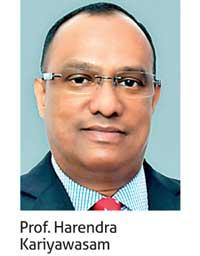06 Nov 2021 - {{hitsCtrl.values.hits}}
As education is among the most disrupted industries by the pandemic, due to its quick shift into distant learning, that online pivot at the same time has provided an option for local education authorities to consider, if they could use that as a springboard to increase the numbers enrolled for the state university system, addressing a decades-old bottleneck in the tertiary education.
 When the pandemic struck the country in March 2020 and in-person learning at all levels - primary, secondary and tertiary levels - became impossible, the state university system embraced e-learning to continue their academic studies and that experiment has proved largely successful albeit some teething issues, according to University of Sri Jayewardenepura Prof. in Accounting Harendra Kariyawasam.
When the pandemic struck the country in March 2020 and in-person learning at all levels - primary, secondary and tertiary levels - became impossible, the state university system embraced e-learning to continue their academic studies and that experiment has proved largely successful albeit some teething issues, according to University of Sri Jayewardenepura Prof. in Accounting Harendra Kariyawasam.
“The closure of universities as a result of COVID-19 has promoted digitalisation of education to a greater extent. Now it has become an essential component of Sri Lankan university education,” said Prof. Kariyawasam talking about the progress made in digitalisation of the university education in Sri Lanka, at a recently held conference.
“I am happy to say that all universities in Sri Lanka quickly adopted the e-learning process,” he added.
Responding to a question if this remote learning pivot could be used to increase the annual student intake, Prof. Karayawasm responded in the positive.
As classroom education is slowly returning, with the country gradually coming out of the pandemic, the academics and policymakers are actively assessing if school education could be made hybrid by way of blending the delivery, with the good attributes learned during the online experiment had for more than a year for better educational outcomes.
Meanwhile, the remote learning brought a lasting change in delivery of tertiary education and all other adult learning programmes happen outside the state university system, as it was wholeheartedly welcomed by both the educators as well as the recipients, due to its tremendous cost and time savings.
Hence, all signs indicate that it is here to stay.
Weighing in on this benefit, Prof. Karayawasam said the undergraduates, who opt to work part-time for various reasons and others engage in internships, now no longer required to attend for in-person lectures, instead he could access the lectures at his convenience from anywhere he wants at any time of the day and sit for exams conducted online.
“Today, all the national universities in Sri Lanka have improved to the state of holding examinations in a virtual platform successfully,” he said.
Citing the case at the University of Sri Jayewardenepura, where he is the Head of the Department of Accounting, he said all 12 departments under the Business Management and Commerce faculty, with over 5,000 students, now pursue their academic studies via a system titled ‘Learning Management System’, in which pre-recorded lectures are uploaded under each subject while online, real-time lectures are also conducted for further discussion and support, with additional reading materials and access to libraries are also facilitated.
“Therefore, even after the situation becomes normal, e-learning can be continued for the benefit of such students,” he added.
However, Prof. Karayawasam expressed some qualms about university education going fully online, as that could miss the students the crucial experiences in their university life, which come by way of interacting with the academics, peers, engaging in sports and community activities and many other in-person activities, which provide them with a wholesome experience, which may not be able to obtain from elsewhere.
17 Nov 2024 3 minute ago
17 Nov 2024 30 minute ago
17 Nov 2024 2 hours ago
17 Nov 2024 2 hours ago
17 Nov 2024 4 hours ago